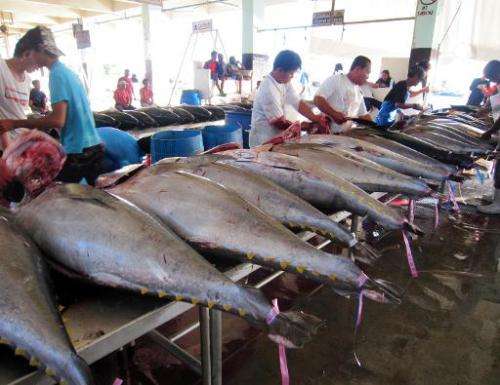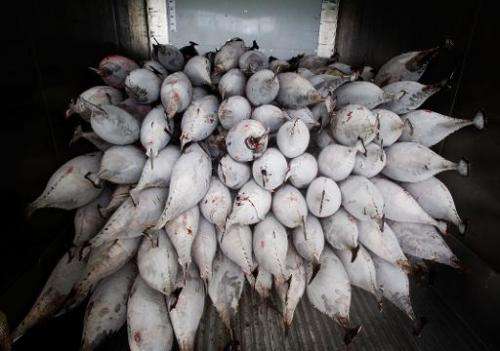Optimism for deal to lower Pacific tuna catches

Conservationists and fishing industry representatives expressed confidence Thursday they were close to agreement on cutbacks in the lucrative tuna fishing industry in the Pacific.
Amid fears about the depletion rate of tuna stocks, there have been calls for action to reduce catches at a week-long meeting of the Western and Central Pacific Fisheries Commission (WCPFC) which wraps up in the northern Australian city of Cairns on Friday.
"Negotiations are progressing rather than stalling on some of the more difficult proposals at this mid-point in the talks," said Amanda Nickson, the Pew Environment Group's director for global tuna conservation.
However, she cautioned there were "a number of issues yet to be resolved, such as how big the quota cuts should be and who should take them".
A record 2.65 million tonnes of tuna was hauled from the Pacific last year, accounting for 60 percent of the global catch, with most of the fishing conducted by so-called "distant water" fleets from as far afield as Europe, the United States, China, South Korea and Taiwan.
Eight Pacific island nations, members of the Parties to the Nauru Agreement, along with Japan and the Philippines, want to reduce the catch of bigeye and yellowfin tuna over the next four years.

But objections from the "distant water" fleets meant a modified proposal was now being worked on, said Brian Hallman, executive director of the American Tunaboat Association, which represents about 40 US-flagged purse seine fishing vessels.
"At this stage, there is not a clear consensus on a solution which would be acceptable to all members," Hallman said.
"However, it does seem that the meeting is moving towards a consensus on limiting, or freezing, the number of purse seine vessels allowed to fish from countries that are not Pacific island nations.
"This would be a major accomplishment, and is an encouraging development."
The WCPFC has a mix of 25 members, ranging from small Niue (population 1,200) to the European Union. It makes decisions by consensus, which critics say makes it difficult to get anything done.
It has been unable to reach agreement for several years on tuna cutbacks despite warnings from scientists of over-fishing.
An international independent assessment has found stocks of bluefin tuna, prized by sushi lovers, have fallen dramatically, with juveniles forming the majority of specimens now being caught, pushing the species closer to extinction.
As a result, another sushi favourite, bigeye tuna, is now coming under severe pressure, while catches of skipjack and yellowfin tuna, which are canned, have also been steadily rising.
© 2013 AFP



















